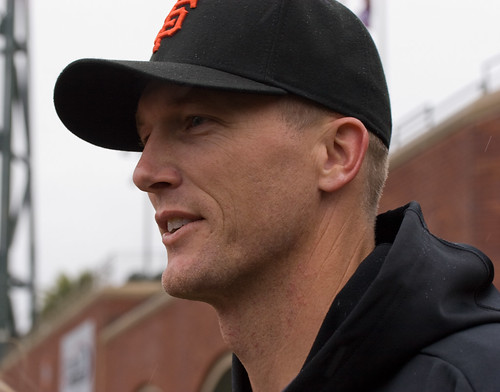 Bob Howry was a typical signing by the Cleveland Indians. In 2003, Howry, while pitching for the Red Sox, struggled with right elbow problems. He would end up on the 60-day dl after undergoing season-ending surgery at the beginning of July to repair his flexor tendon. The Indians would swoop in and sign the damaged righty to a minor league deal after the 2003 season, hoping it would pay off. Obviously, it did. The All-Aught Indians relief pitcher #4 is Bob Howry.
Bob Howry was a typical signing by the Cleveland Indians. In 2003, Howry, while pitching for the Red Sox, struggled with right elbow problems. He would end up on the 60-day dl after undergoing season-ending surgery at the beginning of July to repair his flexor tendon. The Indians would swoop in and sign the damaged righty to a minor league deal after the 2003 season, hoping it would pay off. Obviously, it did. The All-Aught Indians relief pitcher #4 is Bob Howry.Howry was a solid relief pitcher prior to his stint in Cleveland. In his first full season with the White Sox in 1999, he served as their closer and saved 28 games in 34 chances. Keith Foulke replaced Howry as closer after struggling early in the 2000. Howry rebounded in the set-up role and finished the year with a stellar 3.17 ERA in 71 innings. He would continue to be an innings hog in 2001 and the start of 2002, when the White Sox traded him to the Red Sox at the deadline. The 2003 season would become a wash because of the elbow injury, and Howry would turn to the Tribe to rehabilitate him.
Howry spent the first month of the season rehabbing the elbow in extended spring training, having started throwing off the mound for the first time just before the Indians left Winter Haven. He made his first appearance for Buffalo on May 11, and after proving his arm was once again healthy, was called up by the Tribe on June 29th. He ended the season 4-2, with eight holds and a paltry 2.74 ERA. He would pitch in 37 games and 42 2/3 innings, while striking out 39 and walking only 12. He was exactly what the bullpen-starved Indians needed.
For as good as Howry was in 2004, he was that much better in 2005. The Indians had avoided arbitration with Howry by signing him to a one-year, $900,000 deal. Howry was banking on a big year for a big payday, and that's exactly what he got. He may have been the best relief pitcher in baseball. He went 7-4 with 29 holds and a 2.47 ERA in 79 games pitched. He would hold opponents to a .191 batting average against, but Howry saved his best for last. He pitched in 37 games after the All-Star break with a 0.99 ERA. He gave up only four earned runs, which included both a 13-inning scoreless streak and a 21-game streak in which he didn't give up an earned run.
The Indians pen may have been the best in the league during that 2005 season, anchored by Howry and closer Bob Wickman. David Riske, Rafael Betancourt and Arthur Rhodes also had stellar seasons in leading the Indians to a 93-69 record, and a near playoff appearance.
Howry had more than proven his mettle with the Tribe. In the 1 1/2 years in Cleveland, he would go 11-6, with 37 holds, 87 strikeouts and a 2.61 ERA. More than that, he had closer experience, and had proven that his arm was sound. The Indians, coming off a run at the playoffs, had an opportunity to sign Howry. Howry, however, was looking for a three-year deal between $10.5 and $12 million, and the Indians decided to take a chance at signing a bigger target for slightly more money. Closer Bob Wickman was also a free agent, so Shapiro made a full-court press for closers Tom Gordon or B.J. Ryan. If they spent a big chunk of change for Howry, they wouldn't be in play for the two pitchers they had ranked higher.
Howry would be the first to sign, heading to the Cubs with a 3-year, $12 million deal. He would never regain his 2004-2005 success, but he would continue to eat up innings (four straight season with 70+ innings, including an 84 inning season), would spot save, and earn every penny of his deal. What about Ryan and Gordon? Well, Ryan would visit Cleveland with his wife and get the royal treatment from Shapiro and the Dolans. Ryan would then use the Indians to drive up the price, eventually signing a mammoth deal with the Blue Jays to the tune of five years and nearly $50 million. Gordon would sign a 3-year, $18 million dollar deal with Philly. The Indians would re-sign Bob Wickman, Danny Graves and Steve Karsay, and would acquire Guillermo Mota from the Red Sox in the Coco Crisp deal. In other words, Bob Howry's loss turned into a mammoth hole that the Indians couldn't fill.
Hindsight is 20/20, and the Indians likely should have signed Howry to some sort of deal to either close or set-up, but they didn't. Ryan and Gordon would turn out to be busts over the length of their deals. It turns out that Howry was the deal afterall. The Indians paid the ultimate price, but Bob Howry had already earned his place on the All-Aught Indians.

No comments:
Post a Comment